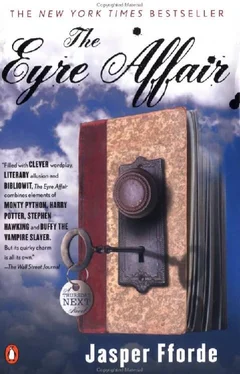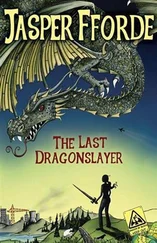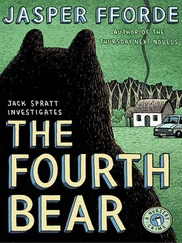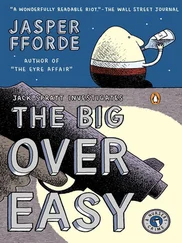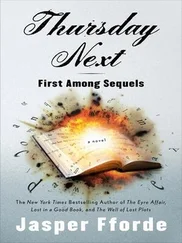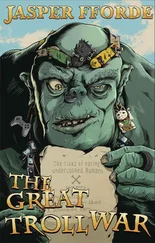‘In the name of all the elves in Christendom, is that Jane Eyre?’ he demands. ‘What have you done with me, witch, sorceress? Who is in the room besides you? Have you plotted to drown me?’
‘Turn around really slowly.’
The last line belonged to the guard, whose own demand broke into Acheron’s reading.
‘I hate it when that happens!’ he lamented, turning to face the officer, who had his gun trained on him. ‘Just when you get to a good bit!’
‘Don’t move and put the manuscript down.’
Acheron did as he was told. The guard undipped his walkie-talkie and brought it up to his mouth.
‘You shouldn’t do that,’ said Acheron softly.
‘Oh yes?’ retorted the guard confidently. ‘And why the hell not?’
‘Because,’ said Acheron slowly, catching the guard’s eye and looking deep inside him, ‘you will never find out why your wife left you.’
The guard lowered his walkie-talkie.
‘What do you know about Denise?’
I was dreaming fitfully. It was the Crimea again; the crump-crump-crump of the guns and the metallic scream that an armoured personnel carrier makes when hit. I could even taste the dust, the cordite and the amatol in the air, the muffled cries of my comrades, the directionless sound of the gunfire. The eighty-eight-calibre guns were so close they didn’t need a trajectory. You never heard the one that hit you. I was back in the APC, returning to the fray despite orders to the contrary. I was driving across the grassland, past wreckage from previous battles. I felt something large pluck at my vehicle and the roof opened up, revealing a shaft of sunlight in the dust that was curiously beautiful. The same unseen hand picked up the carrier and threw it in the air. It ran along on one track for a few yards and then fell back upright. The engine was still functioning, the controls still felt right; I carried on, oblivious to the damage. It was only when I reached up for the wireless switch that I realised the roof had been blown off. It was a sobering discovery, but I had little time to muse. Ahead of me was the smoking wreckage of the pride of the Wessex Tank: the Light Armoured Brigade. The Russian eighty-eights had fallen silent; the sound was now of small arms as the Russians and my comrades exchanged fire. I drove to the closest group of walking wounded and released the rear door. It was jammed but it didn’t matter; the side door had vanished with the roof and I rapidly packed twenty-two wounded and dying soldiers into an APC designed to carry eight. Punctuating all this was the incessant ringing of a telephone. My brother, minus his helmet and with his face bloodied, was dealing with the wounded. He told me to come back for him. As I drove off the spang of rifle fire ricocheted off the armour; the Russian infantry were approaching. The phone was still ringing. I fumbled in the darkness for the handset, dropped it and scrabbled on the floor, swearing as I did so. It was Bowden.
‘Are you okay?’ he asked, sensing something was not quite right.
‘I’m fine,’ I replied, by now well used to making everything appear normal. ‘What’s the problem?’ I looked across at my clock. It was 3 a.m. I groaned.
‘Another manuscript has been stolen. I just got it over the wire. Same MO as Chuzzlewit. They just walked in and took it. Two guards dead. One by his own gun.’
‘Jane Eyre?’
‘How the dickens did you know that?’
‘Rochester told me.’
‘What—?’
‘Never mind. Haworth House?’
‘An hour ago.’
‘I’ll pick you up in twenty minutes.’
Within the hour we were driving north to join the Mi at Rugby. The night was clear and cool, the roads almost deserted. The roof was up and the heating full on, but even so it was draughty as the gale outside tried to find a toehold in the hood. I shuddered to think what it might be like driving the car in winter. By 5 a.m. we would make Rugby and it would be easier from there.
‘I hope I shan’t regret this,’ murmured Bowden. ‘Braxton won’t be terribly happy when he finds out.’
‘Whenever people say: “I hope I won’t regret this”, they do. So if you want me to let you out, I will. Stuff Braxton. Stuff Goliath and stuff Jack Schitt. Some things are more important than rules and regulations. Governments and fashions come and go but Jane Eyre is for all time. I would give everything to ensure the novel’s survival.’
Bowden said nothing. Working with me, I suspected, was the first time he had really started to enjoy being in SpecOps. I shifted down a gear to overtake a slow-moving lorry and then accelerated away.
‘How did you know it was Jane Eyre when I rang?’
I thought for a minute. If I couldn’t tell Bowden, I couldn’t tell anyone. I pulled Rochester’s handkerchief out of my pocket.
‘Look at the monogram.’
‘EFR?’
‘It belongs to Edward Fairfax Rochester.’
Bowden looked at me doubtfully.
‘Careful, Thursday. While I fully admit that I might not be the best Bronte scholar, even I know that these people aren’t actually real.’
‘Real or not, I’ve met him several times. I have his coat too.’
‘Wait—I understand about Quaverley’s extraction but what are you saying? That characters can jump spontaneously from the pages of novels?’
‘I heartily agree that something odd is going on; something I can’t possibly explain. The barrier between myself and Rochester has softened. It’s not just him making the jump either; I once entered the book myself when I was a little girl. I arrived at the moment they met. Do you remember it?’
Bowden looked sheepish and stared out of the sidescreen at a passing petrol station.
‘That’s very cheap for unleaded.’
I guessed the reason. ‘You’ve never read it, have you?’
‘Well—‘ he stammered. ‘It’s just that, er—‘
I laughed.
‘Well, well, a LiteraTec who hasn’t read Jane Eyre?
‘Okay, okay, don’t rub it in. I studied Wuthering Heights and Villette instead. I meant to give it my fullest attention but like many things it must have slipped my mind.’
‘I had better run it by you.’
‘Perhaps you should,’ agreed Bowden grumpily.
I told him the story of Jane Eyre over the next hour, starting with the young orphan Jane, her childhood with Mrs Reed and her cousins, her time at Lowood, a frightful charity school run by a cruel and hypocritical evangelist; then the outbreak of typhus and the death of her good friend Helen Burns; after that of how Jane rises to become a model pupil and eventually student teacher under the principal, Miss Temple.
‘Jane leaves Lowood and moves to Thornfield, where she has one charge, Rochester’s ward, Adele.’
‘Ward?’ asked Bowden. ‘What’s that?’
‘Well,’ I replied, ‘I guess it’s a polite way of saying that she is the product of a previous liaison. If Rochester lived today Adele would be splashed all over the front page of The Toad as a “love child”.’
‘But he did the decent thing?’
‘Oh, yes. Anyhow, Thornfield is a pleasant place to live, if not slightly strange—Jane has the idea that there is something going on that no one is talking about. Rochester returns home after an absence of three months and turns out to be a sullen, dominating personality, but he is impressed by Jane’s fortitude when she saves him from being burned by a mysterious fire in his bedroom. Jane falls in love with Rochester but has to witness his courtship of Blanche Ingram, a sort of nineteenth-century bimbo. Jane leaves to attend to Mrs Reed, who is dying and when she returns, Rochester asks her to marry him; he has realised in her absence that the qualities of Jane’s character far outweigh those of Miss Ingram, despite the difference in their social status.’
Читать дальше
